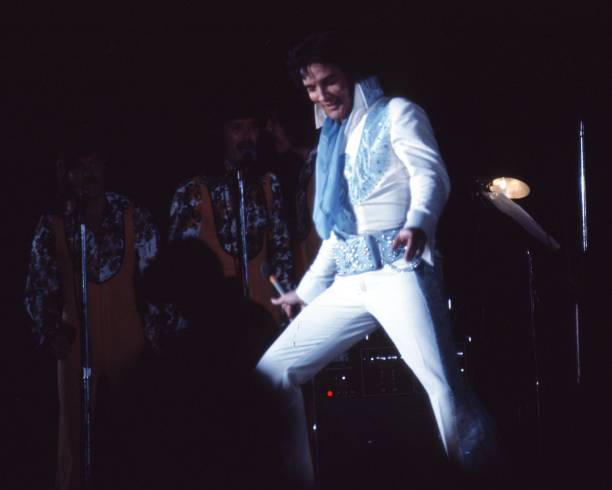 Introduction and Short Summary of the Song
Introduction and Short Summary of the Song
Recorded in 1969 during the legendary American Sound Studio sessions in Memphis, “Any Day Now” is one of Elvis Presley’s most soulful performances of the late 1960s. Written by Burt Bacharach and Bob Hilliard, the song had already been a hit for Chuck Jackson in 1962, but Presley’s interpretation gave it new life. With its themes of impending heartbreak and fear of abandonment, the track resonated deeply with Presley’s expressive voice and the lush Memphis soul arrangements. Featured on his album From Elvis in Memphis, “Any Day Now” became a standout example of Presley’s artistic rebirth, demonstrating his ability to interpret contemporary pop-soul material with authenticity and emotional power.
Origins of the Song
“Any Day Now” was originally written in the early 1960s by Burt Bacharach, one of America’s most celebrated songwriters, and lyricist Bob Hilliard. Chuck Jackson’s 1962 recording became a Top 25 hit on the Billboard Hot 100 and a staple of early soul-pop. The song’s sophisticated melody and bittersweet lyrics made it a favorite among singers looking to explore heartbreak with class and restraint.
---> Scroll down for the VIDEO
Presley’s decision to record the song in 1969 reflected both his admiration for contemporary soul music and his desire to expand his repertoire beyond rock and roll and country. At American Sound Studio, producer Chips Moman encouraged Presley to take on modern material, and “Any Day Now” fit perfectly with the lush, soulful atmosphere of those sessions.
Why Elvis Released “Any Day Now”
By 1969, Presley was determined to move past the formulaic film soundtracks that had defined much of his 1960s output. His Memphis sessions were designed to reconnect him with serious contemporary music. “Any Day Now” was chosen not as a potential single but as a strong album track for From Elvis in Memphis, which blended country, soul, and pop influences into one of the most acclaimed records of his career.
---> Scroll down for the VIDEO
The song’s inclusion demonstrated Presley’s respect for soul-pop traditions and his willingness to tackle sophisticated material. It allowed him to show off not only his vocal power but also his subtlety, delivering the song with emotional nuance rather than bombast.
The Message Conveyed in the Song
“Any Day Now” tells the story of someone living in constant fear of being abandoned by a lover:
“Any day now, I will hear you say goodbye, my love,
And you’ll be on your way.”
The lyrics capture the agony of waiting for an inevitable breakup, a mix of love, dread, and helplessness. Unlike songs that focus on the aftermath of heartbreak, this one dwells on the anxiety of anticipation—the slow, painful unraveling of trust.
Presley’s performance brings out both vulnerability and strength. His voice carries tenderness in the quieter passages and desperation in the crescendos, perfectly matching the emotional arc of the song. The message is universal: the fear of losing love, even before it is gone, can be as painful as the loss itself.
The Recording and Musical Characteristics
“Any Day Now” was recorded on February 20, 1969, at American Sound Studio in Memphis with Chips Moman producing.
-
Vocals: Presley’s performance is rich and nuanced, full of controlled phrasing and heartfelt expression. He avoids theatricality, letting the natural ache of the lyrics carry the emotion.
-
Instrumentation: The Memphis Boys, the studio’s house band, provide a soulful backdrop with piano, bass, guitar, and drums. Strings and horns were later overdubbed, adding a lush orchestral sweep.
-
Backing vocals: Gospel-inflected harmonies from The Sweet Inspirations and other singers enhance the soul-pop feel.
-
Mood: Smooth, melancholic, and elegant, the track balances pop sophistication with Southern soul grit.
The result is one of Presley’s most refined recordings, a perfect example of his ability to adapt his voice to any genre.
Cultural and Commercial Impact
While “Any Day Now” was not released as a single in the U.S., it contributed significantly to the strength of From Elvis in Memphis, an album widely hailed as Presley’s artistic comeback. In the UK, the song was issued as a single in 1981, years after Presley’s death, reaching number 36 on the charts and proving its enduring appeal.
Culturally, the track reinforced Presley’s connection to contemporary soul traditions. His decision to record a Bacharach song placed him in conversation with artists like Dionne Warwick and Chuck Jackson, highlighting his versatility and relevance at a time when many had dismissed him as a relic of the 1950s.
For fans, the song became one of the hidden gems of the Memphis sessions. Though overshadowed by singles like “Suspicious Minds” and “In the Ghetto,” it showcased Presley’s artistry in a quieter, more intimate way.
Legacy of “Any Day Now”
Today, “Any Day Now” is regarded as one of Elvis Presley’s most elegant soul performances. It exemplifies the maturity of his late-1960s work, when he was rediscovering his artistic voice and proving that he could rival contemporary soul and pop singers in depth and sophistication.
The track continues to appear on compilations of Presley’s ballads and Memphis recordings, often cited by critics as one of his most overlooked masterpieces. For many fans, it represents the essence of Presley’s versatility: he could inhabit a song originally associated with soul-pop and make it entirely his own.
More broadly, “Any Day Now” underscores Presley’s role as an interpreter of American music traditions. By 1969, he had moved beyond the rock-and-roll label, embracing country, gospel, blues, and soul. This recording is one of the finest examples of that evolution.
More than fifty years later, “Any Day Now” remains a haunting, beautiful ballad that captures the pain of waiting for love to end. It stands as a testament to Presley’s artistry during his Memphis renaissance and a reminder of his ability to turn even the most polished pop song into a deeply personal expression.